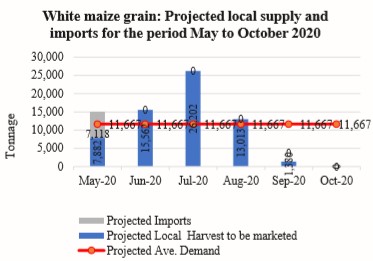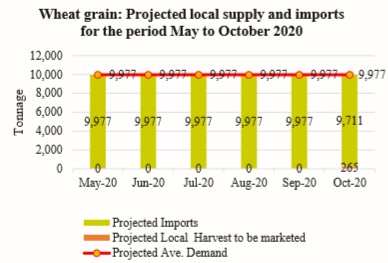
State of food supply and demand in namibia during the COVID-19 crisis
The Namibian Agronomic Board (NAB) is a statutory body, governed by the Agronomic Industry Act, Act No. 20 of 1992. The NAB is mandated to promote the agronomic industry and to facilitate the production, processing, storage and marketing of controlled products in Namibia.
In-light of the COVID-19 pandemic that has affected the day to day operations of all Namibian entities as well as the movements of the entire public. The NAB, as part of its COVID-19 strategic contingency plan would like to address some of the concerns that the public may have in-terms of agronomy and horticulture production in Namibia. Therefore, NAB wishes to inform the public on the measures taken by the NAB and the entire industry to ensure consistent supply of staple food during these challenging times, the status of staple food supply for the next six months, and the logistical circumstantial implications to be experienced during this period.
MEASURES TO ENSURE MINIMAL FOOD SECURITY INTERRUPTION
Millers have secured contracts with suppliers to ensure consistent supply of staple food grains (white maize, wheat and pearl millet) during this period.
The NAB is engaging both producers and processors to ensure that the price of staple food products remains affordable during this COVID-19 crisis.
Continuous monitoring of prices for staple food products at retail level to detect any possible price hikes as a result of the COVID-19 pandemic that may require policy intervention.
NAB staff stationed at all ports of entry and exit in Namibia are available 24 hours daily to provide border control and inland inspections services. Furthermore, they are equipped with the necessary protection (hand sanitizers, masks and gloves) to ensure their safety from contracting COVID-19 as per the government regulations.
NAB staff responsible for issuance of import, export and transit permits for agronomic and horticultural products will be available during weekdays from 08:00 – 17:00 to facilitate the permit application process.
Millers were encouraged to ensure that there is sufficient stock of staple food products in their silos or warehouses for continuity of food supply.
GRAINS, FRESH FRUITS AND VEGETABLE SUPPLY AND DEMAND PROJECTIONS FOR THE PERIOD MAY 2020 TO OCTOBER 2020
White maize: The projected local white maize demand for the next 6 months stands at 70 000 Metric Tons (MT). The expected harvest to be marketed to processors and silos from our Namibian producers for the period under review stands at 64 039 MT as outlined in Figure 1. The shortages in projected demand will be supplemented by imports from South Africa to ensure sufficient supply.

Pearl millet (Mahangu): The projected local pearl millet (mahangu) formal market demand for the next 6 months stands at 1 800 MT. Namibian producers are expected to market 1 823 MT to processors, hence indicating a sufficient supply for the period under review. Shortages experienced after this period will be supplemented with imported grains from India. It is worth noting that due to good rainfall conditions experienced in most of the pearl millet production zones, a good harvest is expected, which will ensure the much-needed food relief at household level.

Wheat: The projected local wheat demand for the next 6 months stands at 59 861 MT. However, our local producers are only expected to produce and market 265 MT to processors during the period under review. Therefore, it is expected that a total of 59 596 MT will be imported during the period under review mainly from Russia, Poland and South Africa in order to close the gap between supply and demand.

Horticulture (Fresh Fruits and vegetables): The total projected local horticulture (fruits & vegetables) demand for the next 6 months stands at 48 580 MT. Namibian producers are expected to produce 22,042 MT during the period under review. Therefore, the local production of horticulture will be supplemented with imports of mainly fruits from South Africa to ensure sufficient supply.
LOGISTICAL CONCERNS DURING THE LOCKDOWN PERIOD
The Ministry of Agriculture, Water and Land Reform has ensured the listing of food supply chain related operations, including farming and other support services such as ICT, Permits issuance, Border control, Food Safety and Standards, Transportation, Warehousing, Input suppliers etc. as essential services. Meaning, the ports, road and rail networks will remain open to facilitate trade through the importation and exportation of agronomic and horticultural products during the lockdown period. Therefore, it is expected that there will be no logistical interruptions in ensuring food security in the country even though there may be delays due to procedural challenges as a result of precautionary measures implemented to curb the spread of COVID-19.
The NAB would like to assure the general public, that the agronomy and horticulture industry role players have taken measures to ensure and maintain sufficient food supply to meet the demand for all Namibians during these challenging times. More measures and regular updates will be communicated to the public in the future. Furthermore, the NAB would like to thank all the essential staff from the various sectors that are at the forefront of fighting this pandemic. We appreciate each and every one of you and we are proud of your efforts in the fight against the COVID-19 pandemic. Together we can take this nation to greater heights.
For further enquiries, contact our Public Relations Officer, Ms Auguste Fabian on 061 379500 or email at PRO@nab.com.na
